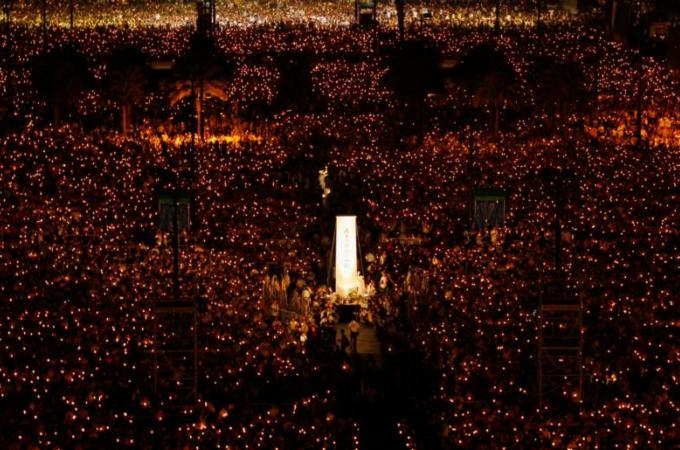Hong Kong Catholic official says Masses will mark Tiananmen anniversary
MUDGEE, Australia (CNS) -- Hong Kong, citing concerns over COVID-19, has not granted permission for the annual public commemoration of the Tiananmen Square massacre, but a Catholic official said people will still be marking the date.
"We may not be able to be at the Victoria Park this year, but it does not mean that there will be no vigil," Fung Yatming, Hong Kong diocesan spokesman, told Catholic News Service. "We have special Masses at various churches on June 4 in the evening."
Hong Kong's traditional vigil marks the end of weeks of student protests in 1989, when Chinese military fired on protesters in Beijing's Tiananmen Square. Estimates of those killed ranged from hundreds to thousands, with thousands wounded. British files declassified in 2017 said a Chinese official told the United Kingdom ambassador to China at the time that at least 10,000 people had been killed.
As a special administrative region, Hong Kong is the only place in China were the massacre can be commemorated, and the ceremony often draws more than 100,000 people.
During the pandemic, public gathering restrictions in Hong Kong were due to end in late May, but on May 19, they were extended until the end of June 5.
Masses recommenced in Hong Kong June 1, more than two months after they were suspended due to the coronavirus.
Some have expressed concern that the vigil might have been permanently finished at the behest of Beijing as part of new security laws it has promised to enact to prevent sedition, secession and activities related to terrorism. Beijing has described the current Hong Kong street protests as terrorism. China's parliament, the National People's Congress, voted May 28 to allow the legislation, which now must be drafted and passed.
The law would upend the so-called "one country, two systems" method of governing Hong Kong. Under this deal struck with Great Britain when it handed back control of Hong Kong to China, Hong Kong would operate under its own Basic Law from 1997 to 2047.
"Everyone's concerned, of course, due to uncertainty," Fung told CNS. He added there are no details about the legislature or information on how any law would be implemented as well as no information on who or what could be affected.
Asked if the diocese was concerned the new laws could lead to the sort of religious persecution seen in mainland China, Fung said, "Suppression is not anything new. It has been happening, continuously, to the universal church since the very early days. But no matter what, please remember: '... and behold I am with you all days, even to the consummation of the world,'" he said, quoting the Gospel of St. Matthew.
The Diocese of Hong Kong's Justice and Peace Commission has previously raised concerns about the violent police response to protesters and described the Hong Kong government as "totalitarian" in its response to protesters. It backed the protesters' five demands, which include an investigation into police brutality.
The protests began in June 2019 in opposition to a controversial extradition treaty with mainland China proposed by Hong Kong's Legislative Council. This mass protests, some with well over 1 million people, voiced concerned about the growing influence of the authoritarian mainland government. The Hong Kong government had previously tried to introduce a similar law in 2003, but street marches then saw it withdrawn.
Cardinal Joseph Zen Ze-kiun, retired bishop of Hong Kong, and Auxiliary Bishop Joseph Ha Chi-Shing have been prominent with support of protesters.



















